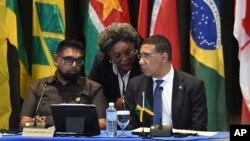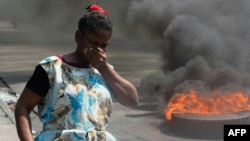U.N. Secretary-General Antonio Guterres on Tuesday called on all stakeholders in Haiti to “act responsibly” and take steps toward implementing the agreement reached late Monday for the establishment of a transitional government and the subsequent resignation of Prime Minister Ariel Henry.
“The secretary-general takes note of the agreement reached yesterday by Haitian stakeholders on a transitional governance arrangement, including the establishment of a presidential council and the appointment of an interim prime minister,” spokesperson Stephane Dujarric told reporters.
“He also takes note of Prime Minister Ariel Henry’s announcement that he would resign immediately upon the installation of a transitional presidential council,” he said.
The agreement was reached at a meeting of the Caribbean Community bloc, CARICOM, held Monday in Kingston, Jamaica. The transitional government will be in place until new elections are held.
Assassination, turmoil
Haiti has been in turmoil since the July 7, 2021, assassination of President Jovenel Moise at his home in the capital, Port-au-Prince. Violent armed gangs now control much of the capital and have spread to other parts of the country. They have carried out massacres and kidnappings, human trafficking, and sexual violence. Last year, Haitian officials said more than 5,000 people were killed and more than 3,000 were kidnapped.
The situation has continued to rapidly unravel this month, with gangs trying to seize the country’s largest airport and helping thousands of prisoners break out of jail.
The United Nations says Haiti needs a combination of a strengthened national police force, the rapid deployment of a multinational support force and credible elections to put the country on the path back to security and stability.
In October, the U.N. Security Council approved plans for a Kenyan-led multinational support force of about 2,000 police officers to assist the Haitian National Police. But the mission has faced numerous delays in Kenya’s courts and was in limbo again Tuesday after Nairobi said it was pausing the deployment until a “sitting government” is in place in Haiti. The mission also has funding, equipment and logistical gaps.
European Union foreign policy chief Josep Borrell was at the United Nations on Tuesday and said the bloc supports the deployment of the multinational force.
“We believe that the international community has to engage in order to make the Haitian people get out of the black hole where they are,” Borrell told reporters. “Alone, they will not succeed. That’s clear.”
Growing hunger
The U.N. says the insecurity has displaced 360,000 people — more than half of them children. Nearly half the population — 4 million people — are acutely food insecure, as gangs block major roads from agricultural areas to the capital, and the country’s main seaport has been closed since March 7 due to the insecurity. The country relies on imports for half its food.
The head of the World Food Program said Tuesday that deployment of the multinational security support mission is promising, but if Haiti’s hunger crisis is not addressed, it could negatively impact efforts to restore security.
“Haiti needs more than just boots on the ground. Efforts to restore law and order must be matched by an equally effective humanitarian response to meet soaring needs,” said Cindy McCain, WFP’s executive director.
She said WFP desperately needs funds to meet the scale of needs.
The U.N. humanitarian appeal for Haiti is just 2% funded, despite more than 1 million people teetering on the brink of conflict-related famine. McCain warned that without a cash injection, funding for hot meals will run out in two weeks.
Since violence escalated this month, WFP says it has helped more than 280,000 people, including serving 62,000 hot meals to 14,000 displaced persons.
Speaking to reporters over a video link from a food warehouse in the city of Cap-Haïtien, Jean-Martin Bauer, WFP’s country director in Haiti, said humanitarians need the seaport to reopen so they can replenish their food stocks, which could run out in a matter of weeks.
He said people are stuck in their homes by the violence, hurting their ability to earn money and buy what little food is available on the market.
“Food prices are rising, incomes are lowering, and at the same time, there is also population displacement aggravating preexisting vulnerabilities,” he said. “So, that makes me quite concerned.”
Health services are also collapsing. Many hospitals and clinics have had to close because of a lack of staff and supplies. The U.N. said Tuesday that there is a serious shortage of blood at the National Blood Transfusion Center, and efforts are under way to bring in blood from neighboring Dominican Republic.






